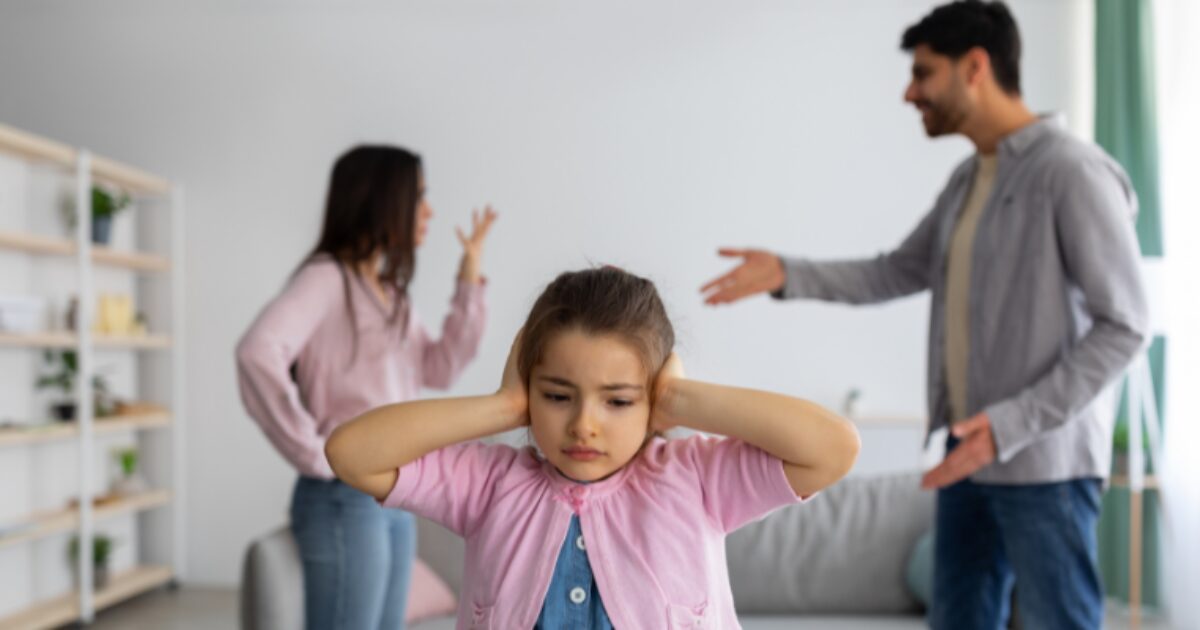
How a Childhood Trauma Test Can Help You Heal from Early Life Wounds
- January 15, 2024
- Scientific Insights
- 0 Comments
How do you identify childhood trauma in adults? There are many effective ways, including paid and free. Each method has advantages and disadvantages, but they all have the same goal of helping you detect whether you are having trouble with trauma or not.
Currently, Childhood trauma testing is a trend that is receiving a lot of attention from everyone.
But Is the childhood trauma questionnaire reliable? What benefits does this test really have? Who is allowed to use this test? Where should I take the test?
All the answers are in this article. Let’s get into it and start a journey to understand yourself and heal your soul.
Table of Contents
What is a Trauma Test?
A trauma test is a psychological assessment that allows you to check if you have trauma or not. Basically, It is a way to identify and assess the emotional, psychological, and behavioural effects of trauma. Therapists and psychologists often use a group of questions to identify the signs of trauma in a person as well as understand their status mental and emotional well-being.
The questions on the test are usually not too long or complicated. It also does not require a right or wrong answer. Instead, it is a series of questions related to topics such as your experiences, accidents, violence and more subtle forms of trauma like emotional neglect.
After the trauma test collects all the necessary information from your answers, it will start analyzing the data, for example, what you have been through and how it might be affecting you and then send back the test results for you.
Why do these test works well? Because they can give a quick yet useful treatment and support. If someone has been through a difficult time in life with a lot of mental health damage, this test is like a VIP ticket, helping them heal and move forward.
Read more: Mental Health Tips for College Students
What Type of Trauma Test
There isn’t a one-size-fits-all “trauma test” because each professional has their own methods to apply. However, Mental Map Guide will give you an idea of common types of trauma tests.
- TSI
- PCL
- ACE
Trauma Symptom Inventory” (TSI) The TSI is a self-report questionnaire where you will answer questions related to your thoughts, feelings, and behaviours around trauma issues. The main point is to assess symptoms associated with trauma, like accidents, anxiety, emotional abuse, stress, depression, and dissociation.
Posttraumatic Stress Disorder Checklist (PCL) is another effective test usually used to diagnose PTSD. The questions tend to focus on specific symptoms related to trauma, like nightmares or flashbacks.
Adverse Childhood Experiences (ACE) is indeed a type of trauma test. Its questions consist of your experiences growing up; the higher ACE scores you have, the higher your risk of various health issues, including mental health conditions, chronic diseases, and social problems.
Besides, several other assessments and tools are used to evaluate and measure trauma. Here are a few additional types of trauma tests you might know.
- Clinician-Administered PTSD Scale (CAPS)
- Impact of Event Scale (IES)
- Trauma Screening Questionnaire (TSQ)
- Life Events Checklist (LEC)
- Harvard Trauma Questionnaire (HTQ)
- Trauma and Attachment Belief Scale (TABS)
- Trauma Symptom Checklist for Children (TSCC)
As you see, Each assessments vary in their focus, ranging from general trauma to specific disorders like PTSD. They are tailored to different age groups or cultural contexts.
Read more: Why Is Sleep Important for Mental Health?
The Benefits of a Childhood Trauma Test for Healing Childhood Wounds
| Early Detection | Identifies and acknowledges childhood trauma early, allowing for timely intervention. |
| Increased Self-Awareness | Getting to know yourself better by understanding how your past influences your today |
| Informed Therapy Planning | Guides therapists in developing personalised treatment plans based on identified traumas. |
| Validation of Experience | Provides validation and acknowledgment of the individual’s past, fostering healing. |
| Breaking the Cycle | Aids in breaking the cycle of generational trauma by addressing issues at their root. |
| Improved Coping Strategies | Equips individuals with insights to develop healthier coping mechanisms. |
| Empowerment and Autonomy | Taking charge of your healing journey is about empowerment and self-guidance. |
So, talking about childhood trauma tests it’s a great way to help people heal from those early wounds. Seriously, they bring some real advantages to the table.
First off, these tests can go into your inner self, bringing out the things hidden deep inside. Childhood trauma is not easily detected through the expression on your face, and sometimes it’s sneaky, it’s how you see the world or cope with emotions. And these perfect tests help reveal those hidden struggles.
Once you know what you’re facing and dealing with, you will catch a roadmap. The results guide therapists and counsellors on how to tailor their approach. It’s not a one-size-fits-all deal; it’s about unique personalised strategies to help someone overcome their tough challenges.
Then there’s the empowerment step. When you are Taking a childhood trauma test, it’s like you are reclaiming control in hand. And It’s a good chance to say, “Hey, I see what’s going on with myself, now I’m ready to work through it.” That awareness is a really big step toward healing.
And don’t forget the validation aspect. Sometimes, you might be confused about whether what you went through was a big deal. A positive result on a trauma test can help you determine and clarify your friend’s current health status. It can be a powerful validation that, yeah, those experiences mattered, and it’s okay to acknowledge and address the impact.
Finally, these tests are key tools for healing and relaxation, like a first aid kit for emotional wounds. They bring clarity, detailed guidance, and a sense of direction on the journey to recovering from the bumps and bruises of the past.
Read more: The Implications of Body Shaming on Mental Well-Being
7 Best Places for Childhood Trauma Tests Online 2024
Here are the best seven websites where you can have childhood trauma tests online for free.
1. Quizterra: Are You Affected by Childhood Trauma?
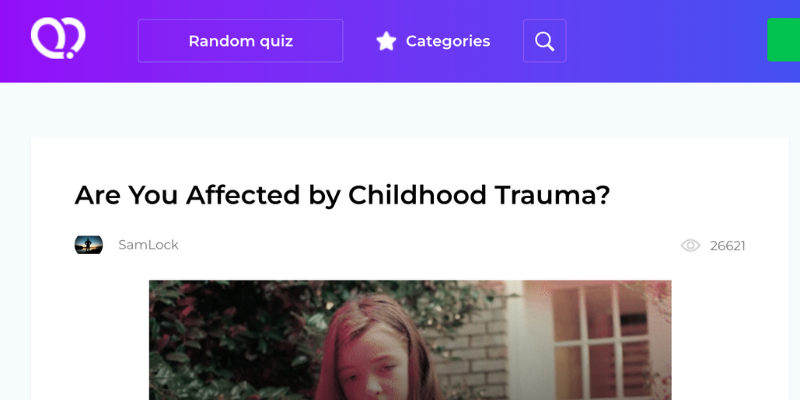
Ever notice how we sometimes act just like our parents without even realizing it? Or maybe our past experiences have left us with certain habits. Take this quick 10-question test to think about your feelings and experiences. No numbers involved, just a simple explanation of what your answers might mean.
2. Solution Tales: Childhood Trauma Quiz
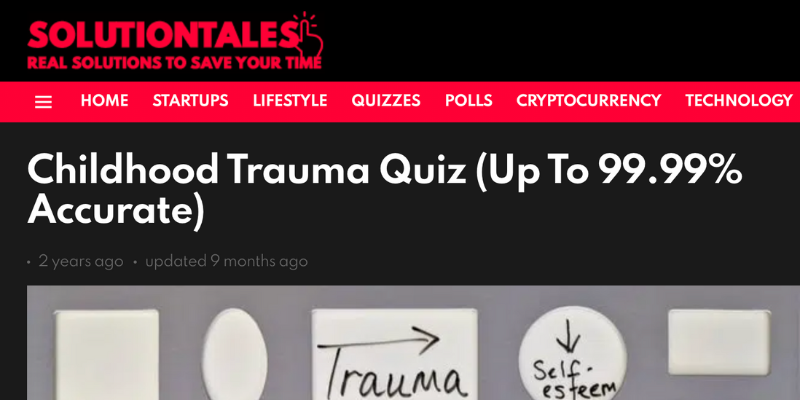
This quiz has 20 questions, each describing childhood situations you might relate to. Pick the option that best matches your experience for each question. It’s not a substitute for professional diagnosis, but it could shed light on signs of anxiety, depression, or PTSD.
3. Psych Central: Emotional Neglect Quiz
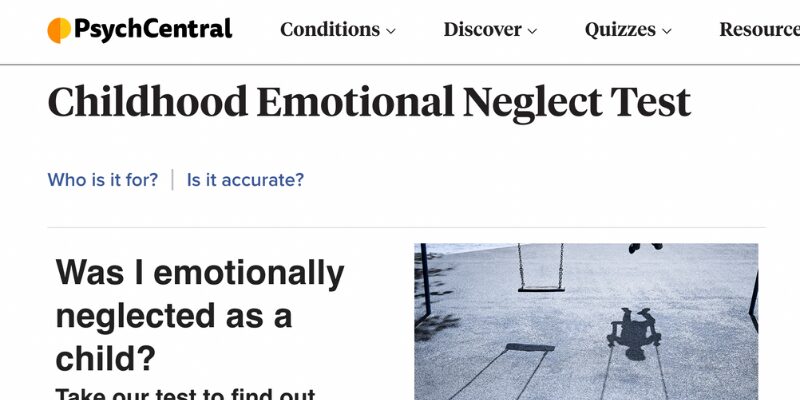
Ever heard of childhood emotional neglect? It’s when a parent or caregiver doesn’t acknowledge or validate your feelings, messing with your self-worth and social connections. This quiz helps gauge your experiences with emotional neglect as a kid. Answer questions about your growing-up years with your caregiver. You can also take the quiz for someone else, but keep in mind it might not be as accurate, depending on your view of their situation.
4. PsychMechanics: Childhood Trauma Questionnaire for Adults
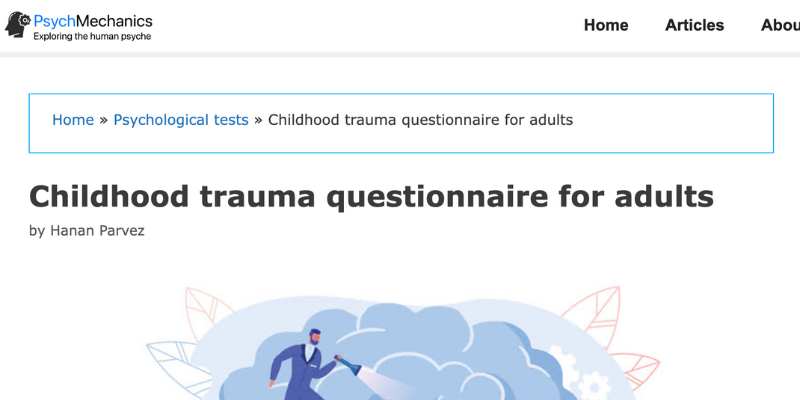
Childhood trauma can stick with you, affecting emotions, relationships, and self-esteem. This test checks how much it’s impacting you. It starts with questions about your childhood and moves to how it still affects you today. Answer on a Likert scale with options like strongly agree to strongly disagree. Quick heads up, it only takes 2-3 minutes.
5. NPR: Take the ACE Quiz
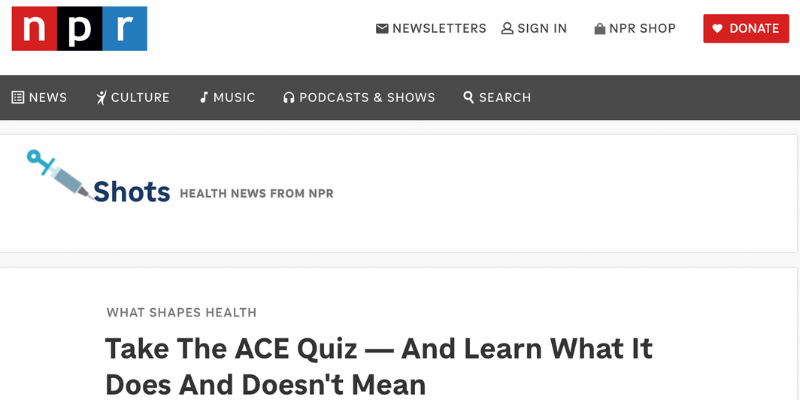
Your ACE score is a tool to recognize and heal from past experiences, reducing the risk of future harm. A higher score suggests a higher likelihood of chronic diseases and mental health issues later in life. Yet, health is influenced by various factors like genes, lifestyle, coping skills, and social support. Keep an open mind as you take this 10-question test, exploring different negative experiences before turning 18.
6. Quizience: Childhood Trauma Test
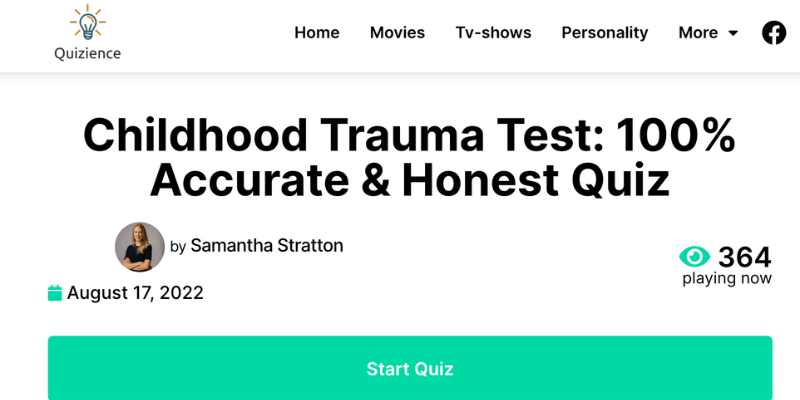
This set of questions delves into your psychological landscape, touching on both childhood and adult challenges. It aims to uncover signs of emotional or physical abuse, caregiver neglect, stress, and trust issues. Additionally, it serves as a tool, aligned with ACE criteria, to gauge PTSD levels in adults who faced adversity in their early years.
7. PsychMechanics: Childhood Emotional Neglect Test

This test gauges the emotional neglect you may have encountered in your younger years. With 18 questions using a five-point scale from strongly agree to strongly disagree, it assesses your current feelings. Respond based on your present emotions. The quiz specifically measures your level of neglect concerning emotional numbness or abandonment issues.
Final Thought
I hope you find this collection of quizzes and tests on childhood trauma helpful and enlightening. While childhood trauma can leave lasting impacts on mental health, remember it doesn’t have to be your sole identity. Healing and growth are possible, and these tests can be a starting point for that journey. If you’re interested in more articles on health, do check out the Mental Map Guide Blog.






